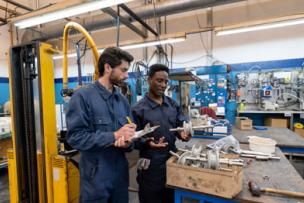But how do you become a CNC programmer, and what qualifications do you need? And how much does a CNC programmer typically earn? Here’s what you need to know about joining this potentially rewarding field.
What Does a CNC Programmer Do?
Manufacturers use computer numerically controlled (CNC) programming to tell CNC machines how to cut and fashion parts.
A CNC programmer will typically determine the sequence of actions needed to make a part, and then write the programming instructions for the computing module that is used to run the CNC machines.
The programmer’s calculations will consider the material used and the best approach for the cutting tools, plotting out each step for cutting the materials to fashion components used in a variety of items, from washing machines to aircraft.
Depending on the shop, CNC programming may be performed by CNC programmers, or by machine operators.
Aside from programming the CNC machine, these professionals may also be responsible for reading and interpreting design blueprints and adjusting existing software and codes to make improvements to the produced parts. They may also maintain part quality and safety standards, and maintain CNC equipment, or intervene if any adjustments need to be made to the CNC cutting program.
CNC Programmer Job Salary: How Much Can You Earn?
The earnings potential for a CNC programmer depends on his or her years of experience.
A CNC machine programmer working in the United States who is at the most senior levels of the field, with more than seven years of experience, can expect to make a base salary of $107,000, on average, according to Salary.com, with the range typically falling between $84,700 and $115,000.
The inclusion of a bonus or another type of special payment raises the median base salary for this position to $108,800, with the range falling between $86,100 and $116,200.
Read more: Manufacturing Guide: How to Become a CNC Machinist









Talk to Us!
Any online programming education?
42Hi Felix,
While there are many online training programs, we recommend the ACE Training Program which is virtual. You can learn more about it here.
90Go to your local technical college. They have real CNCs and usually CAD/CAM and manual programming classes, where you will gain theoretical and hands on experience.
Most require some prerequisite classes such as print reading, intro to manual machining, and machine tool math. That way you will get the fundamentals on how to set up vises, find the datum faces of the part, set the origin, learn the basics of tooling, such as taps, drills, etc. and calculate feeds and speeds.
Plus a lot of technical colleges have grants and scholarships that will cover tuition and fees and even pay for your tools.
85At the company I work for, most of the CNC programmers (they run the machines and make the parts) came up through the trade. It s essential to have a sound machining background. The software keeps getting more and more powerful. Good computer skills are also essential, to run the programs, and handle all the files.
52Hi I'm just wondering if you have any recommendations for me I'm in California by Los Angeles
44Hi Carlos, There is demand for CNC programmers nationwide and we have many suggestions for you. Can you tell us more about where you are in your career and your technical experience so we can help to point you in the right direction?
94Hello, my name is Reynold I just got a job a few weeks ago as a drafter and they recomend that i learned a cam program such as alphacam I'm in New York do have any online courses in cam.
Thanks
RM
50Leave a reply
Your email address will not be published. Required fields are marked *